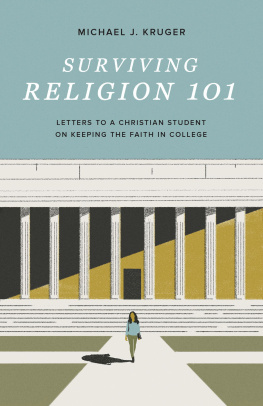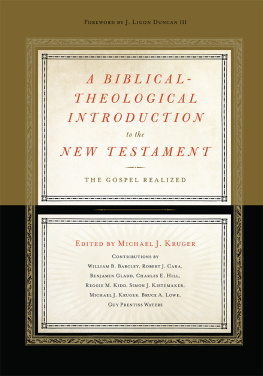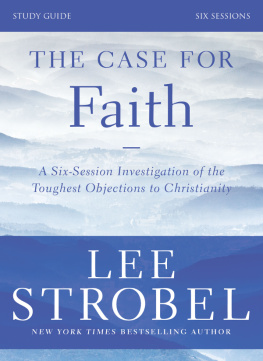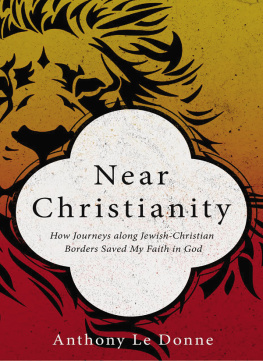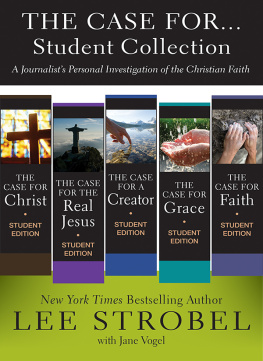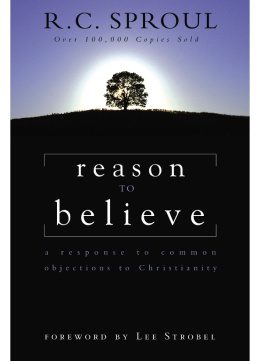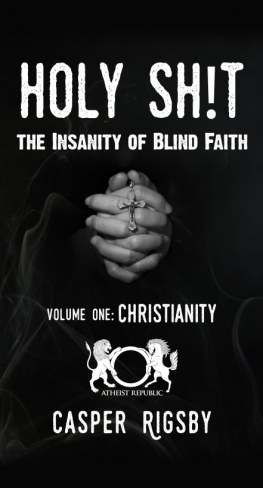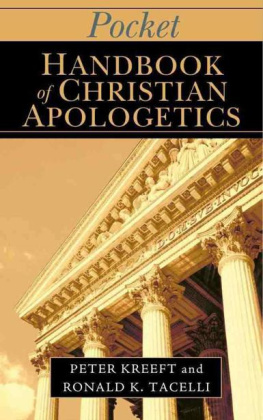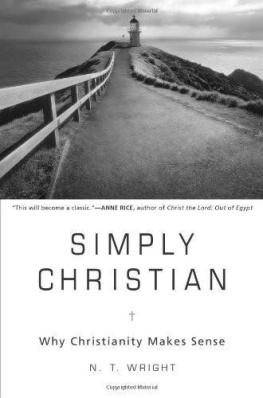Table of Contents
Landmarks
But there is a sort of attack on the emotions which can still be tried. It turns on making him feel... that all his religion has been a fantasy.
C. S. Lewis, The Screwtape Letters
Dearest Emma,
By now, youve read the many letters I have written to you. Together, theyve all had a singular purpose, namely, to encourage you in your faith and to remind you of the truth of what you believe. And I hope theyve accomplished that, at least to some extent.
But heres a reality you need to face. Even with many good reasons to believe, every believer still struggles with doubt. There will be timesand maybe youve already experienced themwhen you wonder whether everything you believe is a lie. Maybe we are the ones who are deceived, you might think. Maybe all the critics are actually right. Maybe this whole Jesus thing is just a religious experience, no different (and no better) than the experiences of the Buddhists, Hindus, or Muslims.
Put simply, maybe were just wrong .
Now, these sorts of doubts can be very weighty. And sometimes they can be very painful to work through. It can feel like your whole life, your whole identity, even your whole future, hangs in the balance.
While such doubts are tough enough to handle in and of themselves, they are exacerbated by our current cultural climate. Many voices todayeven so-called Christian voicesinsist that the problem with evangelicals is that they are far too certain about what they believe. Indeed, certainty is now viewed as the supreme vice. And doubt is presented as the ultimate virtue. The epitome of intellectual sophistication, we are told, is to question everything you believe (which, of course, backfires because you would also have to question your questioning!). This group will cheer on your doubts, encouraging you to leave behind any confidence you have about the truth of Christianity.
On the flip side, other segments of Christianity heap scorn on anyone who doubts. They tell you that good Christians never struggle with what they believe. You just have to accept everything youre told, no questions asked. In such circles, theres no room for dealing with peoples intellectual objections or concerns. Simplistically, we are told to just believe. It can feel very suffocating.
With these two competing perspectives out there, it is easy to feel caught in the middle. But thankfully, these are not our only two options. In this letter, I hope to lay out a better path forwarda path that can help provide some balance and comfort as you work through periods of doubt.
No, Theres Nothing Wrong with You
Okay, the first thing to get on the table is that doubts dont make you a bad Christian. I know that sometimes it can feel that they do. Whenever we question our beliefs, we can begin to think we have failed in some way. Perhaps we are just a second-tier believer. We feel like weve let God down, as well as our family and friends. We might even look to the great heroes of the faith and marvel at how they always seemed so sure and steady in their faith. If only we could be more like them, we think.
But heres the reality. Even the heroes of our faith struggled with doubt. Indeed, every believer, at some level, has labored through questions about what they believe. Consider the great Reformer Martin Luther. Its easy to marvel at his strength, fortitude, and courage in the face of unspeakable opposition. But you may not know that he struggled intensely with serious doubt and despair, what we might call the dark night of the soul. Luther doubted his own faith, questioned his calling, and even wondered whether God had turned his back on him. So intense were his doubts that he labored through tears, anxiety, terrors, and bouts of deep depression. His friend Philipp Melanchthon even feared that Luther was on the verge of death.
In fact, Spurgeon struggled with deep depression and anxiety for much of his life over such matters.
Heres the point, Emma: Its normal to struggle with doubt in the Christian life. It doesnt mean something is wrong with you. The issue is not whether you face doubt but how you respond to it.
Different Kinds of Doubt
So what do we mean exactly by the word doubt ? As for a definition, we can begin with what doubt is not . Doubt is not the same as unbelief . Unfortunately, many Christians equate the two, which is why they feel so guilty about their doubts. They assume it means that they are rebelspeople who just stubbornly refuse to believe God. But this misconception needs to be done away with once and for all. Doubt is not the same as being an unbeliever.
In other words, doubt is a form of wavering; its to be of two minds about something.
While doubt is not the same as unbelief, it may lead to unbelief if left unchecked. Thus, the Scriptures consistently call us away from doubt and toward our faith. When Jesus describes the way we should pray, he says, Have faith and do not doubt (Matt. 21:21). And James tells us that doubting can lead to an unstable life: Let him ask in faith, with no doubting, for the one who doubts is like a wave of the sea that is driven and tossed by the wind (James 1:6).
In short, doubt can be a hindrance to our faith. Indeed, it can be quite serious. But it is not the same thing as a lack of faith. And God is very patient with those who struggle with doubts. Jesus himself was very long-suffering with the doubts of the disciples, even showing great patience with Thomas, who insisted that he would not believe until he put his hands in Jesus s side (John 20:27).
Okay, with that definition in hand, lets now look at two different species of doubt. The first, and perhaps the main kind, of doubt that people experience is doubt about the truth of Christianity . Such doubts might involve questioning core Christian beliefs such as the reliability of the Bible, the reality of the resurrection, the divinity of Jesus , or maybe even the existence of God. These sorts of doubts are more intellectual in nature, though (as we shall see below) they can be caused by a variety of factors, some of which are circumstantial and even emotional.
The good news about this sort of doubt is that there are more straightforward, concrete ways to address it. If a person has a genuine intellectual question, we have great resources available to answer such questions. That doesnt mean peoples doubts are automatically cured by simply reading a few books. But sometimes gaining a basic understanding of the facts goes a long way. Sometimes people have just never heard a solid answer to their questions. Unfortunately, as we will see below, other kinds of doubt are much more complex and difficult to treat.
Before moving on, one clarification is in order. As we try to overcome intellectual doubts and achieve a level of certainty about what we believe, that doesnt mean we must be equally certain about every belief we hold. There are core truths that demand more certainty than more peripheral ones. If you have doubts about the proper mode of baptism (immersion versus sprinkling), surely that is not the same thing as having doubts about whether Jesus rose from the dead. Questioning the former should occasion little anxiety, whereas questioning the latter can have serious consequence on ones Christian life (if left unchecked).
Now lets consider a second kind of doubt. Rather than questioning the truthfulness of Christianity, sometimes we use the word doubt just to describe how we are struggling with some aspect of the Christian life . This might involve feeling like you dont understand God, being confused by a particular doctrine, or wanting to know why God did (or did not do) something. This kind of doubt can also entail doubts about ourselves : Am I really a Christian? Does God really love me? Is he really going to provide for my needs?

